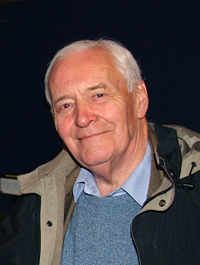
Labour Party (UK) deputy leadership election, 1981
Encyclopedia

Tony Benn
Anthony Neil Wedgwood "Tony" Benn, PC is a British Labour Party politician and a former MP and Cabinet Minister.His successful campaign to renounce his hereditary peerage was instrumental in the creation of the Peerage Act 1963...
unsuccessfully challenged the incumbent deputy leader Denis Healey
Denis Healey
Denis Winston Healey, Baron Healey CH, MBE, PC is a British Labour politician, who served as Secretary of State for Defence from 1964 to 1970 and Chancellor of the Exchequer from 1974 to 1979.-Early life:...
at the party conference. Healey had been elected as deputy leader in the previous year.
As well as Healey and Benn, John Silkin
John Silkin
John Ernest Silkin, PC was an English Labour politician and solicitor.He was the third son of Lewis Silkin, 1st Baron Silkin, and a younger brother of Samuel Silkin, Baron Silkin of Dulwich. He was educated at Dulwich College, the University of Wales, and Trinity Hall at the University of...
also stood in the election. It was the first election to take place using the party's electoral college. At this time 40% of the votes were given to affiliated unions and societies, and 30% each to the Parliamentary Labour Party
Parliamentary Labour Party
In UK politics, the Parliamentary Labour Party is the parliamentary party of the Labour Party in Parliament: Labour MPs as a collective body....
and the individual members and activists of the party. When this plurality in favour of the unions was first introduced, it received considerable criticism from the more social democratic wing of the party. Ironically it transpired that if the unions had had an equal share to the PLP and the membership then Healey's narrow majority would have been wiped out and the more left-wing Benn won the contest.
Results
| First round | |||
|---|---|---|---|
| Candidate | Votes | ||
| Denis Healey | 45.4% | ||
| Tony Benn | 36.6% | ||
| John Silkin | 18.0% | ||
| John Silkin eliminated | |||
| Second round | |||
|---|---|---|---|
| Candidate | Votes | ||
| Denis Healey | 50.4% | ||
| Tony Benn | 49.6% | ||
| Denis Healey re-elected | |||

